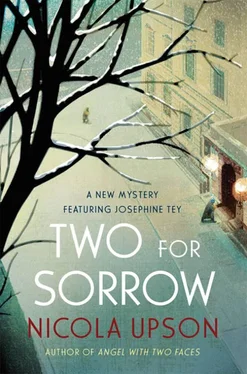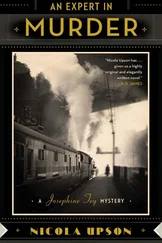‘And what about the death you left behind?’ Penrose had been involved in enough clear-up operations on the underground to know that the usual identification of a body might not have been possible; during the last few years, the country’s dire economic situation had led thirty or forty people a year to view the trains as a way out of their despair, and many of the stations had begun to install deep pits between the tracks to minimise their chances of success and to keep those still alive safe while the train was being moved. Even so, something tangible was usually found at the scene. ‘Were you really so confident that there was nothing on the body which would expose the lie?’ he asked.
‘Everything that testified to Celia Bannerman was with me, in her luggage. The one thing she was wearing that was remotely personal was a locket I’d given her when she first took me in; it was the only thing of any value I had to give at the time. She didn’t wear it very often, but she made a big thing of putting it on that day—asked me to fasten it for her, as if I’d feel better about being abandoned if she left me wearing my jewellery.’
‘Your family—didn’t they wonder what had happened to you?’
‘They disowned me as soon as I was arrested. I went to them when I got out of prison, but they turned me away. Celia was all I had, God help me.’
‘But surely someone must have missed her?’
‘The only people she associated with were connected to her work,’ she said, echoing what Ethel Stuke had told him. ‘Even I was a mission, as it turned out. And nobody who knew her professionally had time to realise she wasn’t there any more; as far as they were concerned, Celia Bannerman left one job and reported when she was supposed to for the next. No one in Leeds knew what she looked like. If someone from Holloway or the hospitals we were in before had turned up, that would have been it, but they didn’t; Leeds was a long way from London in those days, and it worked in my favour that she’d tried to get as far away from me as possible. Of course, I made sure I kept a low profile for the first few years,’ she added, smiling. ‘Very self-effacing was our Celia—she never wanted the limelight, and she always refused any public recognition for what she did. A living saint, you might say.’
‘Until now. That was a very stupid slip, Miss Vale—allowing yourself to be photographed in that way. No wonder you were so angry with Marjorie. I suppose she paid for your arrogance.’ She said nothing, but the look in her eyes and the tight clenching of her hands told him that he was right, and he guessed that the rage which had led to such a spiteful murder had remained with her in the days since Marjorie’s death. ‘I can see how you killed Celia Bannerman and got away with it,’ he said quietly. ‘What I still find astonishing is that you managed to live as her.’
‘I had all I needed to be Celia Bannerman in those two cases and in here,’ she said, tapping the side of her head. ‘She may have had the references, but I certainly had the qualities to live up to them, and in all my life I’ve never let anyone down the way she did. What I start, I finish.’
‘As Marjorie Baker learned to her cost. She and her father knew all this, I suppose.’
‘Good God, no. Don’t be ridiculous—you give them far too much credit. I doubt that either of them had ever heard of Eleanor Vale. They knew enough, though. Marjorie’s father saw the photograph in the Tatler she took home, and he told her I wasn’t Celia Bannerman.’
‘Because he remembered the woman he’d given his child to?’ She nodded. ‘And that’s why you lied about going to see him during the war—to give yourself some sort of continuity with the person you were pretending to be. But Marjorie didn’t trust her father’s word—she had a lot to lose, and she wanted to make sure that what he said was true.’
‘Yes. I’m afraid Ethel Stuke sealed Marjorie’s fate as effectively as if she’d hanged her.’
At last, Penrose understood what Stuke had said that seemed so conclusive to Marjorie. ‘She knew you’d never been attacked, didn’t she? She’d handled your fittings at Motley, and she knew there was no scar.’ It was a simple, feminine thing, but irrefutable, and Marjorie could have had no idea of the danger she was putting herself in by using her knowledge. Her death, he realised now, was a vicious, sadistic parody of the means by which she had gained that fatal piece of information. The peculiarly female intimacy of the dress fitting had come back to haunt her.
Vale nodded approvingly at him. ‘Yes. She was measuring me for silk and piercing me with steel. The letter came just before the final fitting.’
‘She wanted money?’
‘Of course. Nothing more imaginative than that. All the women I’ve taught and nurtured, all the people I’ve fought for to ensure they get a decent working life—and that stupid little bitch wanted everything handed to her on a plate. When I went to Motley on Friday afternoon, I promised her she’d have what she asked for later that night. I kept my word.’
‘And you got her to make sure that her father was there as well?’
‘No. I knew nothing about her father until he turned up drunk at Motley. Marjorie hadn’t mentioned him or how she’d come by her information in the first place, and I certainly had no idea who was in her family. He was waiting for her outside, and he caught me leaving the building. He slurred something about seeing me in that photograph, and that’s when he told me how he knew the real Celia Bannerman.’
‘Did he find out what you’d done to his daughter before you pushed him down the stairs?’
‘Does that really matter?’
Penrose looked at her for a long time before speaking again, astonished at how little remorse she seemed capable of. ‘Don’t you regret any of it?’ he asked eventually. ‘If you could go back to that underground platform, would you really do it all again?’
‘Yes, if it enabled everything that I’ve achieved during the years in between. People aren’t good or bad, Inspector—their actions are, and everyone is capable of both. Take Amelia Sach—a good mother, by all accounts, yet capable of destroying that sacred bond in others to advance her own position. And Celia Bannerman, of course—such an asset to society, so selfless in her efforts to help people, and yet she dropped her little rehabilitation project like a stone the minute a better offer came along. Ambition—that’s what it was about. That’s what it’s always about. Everyone in public life says it’s the work that counts, and what does it matter who does it—but deep down we all want the credit for our little piece of progress.’
‘Even when those achievements are undermined by the very violence on which they’re built? What about the people whose lives you’ve destroyed?’
‘A convict who would have been in and out of jail for the rest of her life? A drunk who made no contribution to society and couldn’t even keep his wife from the gallows?’
‘A police officer?’
‘Who was herself involved in an act of deception.’
‘You’re surely not comparing that with the lie you’ve lived for thirty years?’
‘I’m not the one making any judgements. I’m saying that we all fool ourselves and others to get by. Some of us even making a living out of it.’
The barbed reference to Josephine wasn’t lost on Penrose, but he refused to be drawn by it. ‘Let’s talk about Lucy Peters,’ he said, confident now that they were far enough along with the questioning for his own deception not to matter. ‘Did she know that killing Marjorie wasn’t enough for you? That you had to torture and humiliate her first?’
Читать дальше












